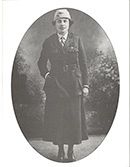A Utah Catholic Woman in World War I
Through the generosity of architect Mike Stransky, the Diocese of Salt Lake City Archives has received a privately published edition of letters of Maud Fitch, a young Catholic woman from Eureka who served as an ambulance driver in France during 1918, the last year of World War I.
The letters reveal a person of immense joie de vivre and bravery, with a love for adventure as well as shopping, dancing, drinking and especially smoking (her cigarette habit persisted the rest of her life). She was, in other words, a liberated woman of the early 20th century, a “flapper” in the parlance of the 1920s, who wrote her own ticket and made her way through life on her own terms.
She was also, though, a very devoted Catholic who never missed an opportunity to go to Mass, which sustained her through every aspect of her life, including driving an ambulance under fire in combat zones.
She was, in short, a remarkable character.
Her father, Walter, of whom she speaks in the most endearing terms, obviously understood and supported his adventuresome daughter. When she announced she was going to join the Red Cross and drive an ambulance in France, he accepted her intentions with enthusiasm and even offered to pay her expenses. Those expenses included not only a stay in London, where she boarded with family members, but also a long period in Paris where she did combat with a Red Cross director who could accept the idea of female nurses, but not ambulance drivers. It even included – incredibly – paying for her own ambulance, a Model T Ford specially outfitted for the purpose, which she herself had to paint the appropriate color and with the appropriate Red Cross insignia.
Her responsibilities included not only learning to drive the Ford, at which she apparently had had little experience, but also maintaining and repairing the vehicle: Most of the other ambulances were of European manufacture and their mechanics were of little help to her.
To the modern mind, the Model T Ford was the very quintessence of automotive simplicity, but it was a new thing in 1918, and her owner’s manual became her constant companion.
Also, though the Model T was simple, it was also very fragile and prone to break down at the slightest provocation. Accordingly, Maud found herself repairing flat tires and cleaning fouled spark plugs almost daily, as well as replacing a broken spring and seeking out a local blacksmith to straighten a bent axle. But it was all exhilarating to her. On a holiday in Paris she wrote home that “It comes over me constantly what a very different life I’ve been thrown into – from the lonely even tenor of one’s way in Tintic to the most stirring turbulent of cities;” and, on another occasion, “Never thought such marvelous things could happen to me living in a wee corner of the earth like Eureka.”
Perhaps not surprisingly, she excelled at her job. Many of the ambulance corps’ evacuation of wounded took place at night, when they could approach the front lines in relative safety. One night in June, though, she made a daring run over a difficult route through heavy bombardment to pick up some patients. She was awarded for her efforts with the French Croix de Guerre medal for bravery in combat.
What would impress most Intermountain Catholic readers, though, would be her ardent faith. Even in the midst of all the hard partying she and her companions were doing in Paris, she always sought out a church for Sunday Mass and missed, while out on the front, her lack of regular access to the Sacraments. Her heart often went back to St. Patrick Parish in Eureka, and she admonished her family to “Be sure always to give all the dear Tintic nuns my love and of course to Father John [Ryan]. I don’t always mention them but the love goes without saying.”
Maud Fitch returned home in 1919. She married late in life and had one son before her husband died in a mining accident on the second anniversary of their wedding. She never remarried. In her later years she was confined to a wheelchair, but continually sported a jaunty beret and smoked her beloved cigarettes. She refused treatment after a cancer diagnosis.
“I’ve lived long enough,” she told her son, “and I want to go home.” She did go home, and is buried today in the Fitch family cemetery in the junipers outside of Eureka.
How I wish I could have known her.
Gary Topping is archivist for the Diocese of Salt Lake City.
© Copyright 2024 The Diocese of Salt Lake City. All rights reserved.



Stay Connected With Us